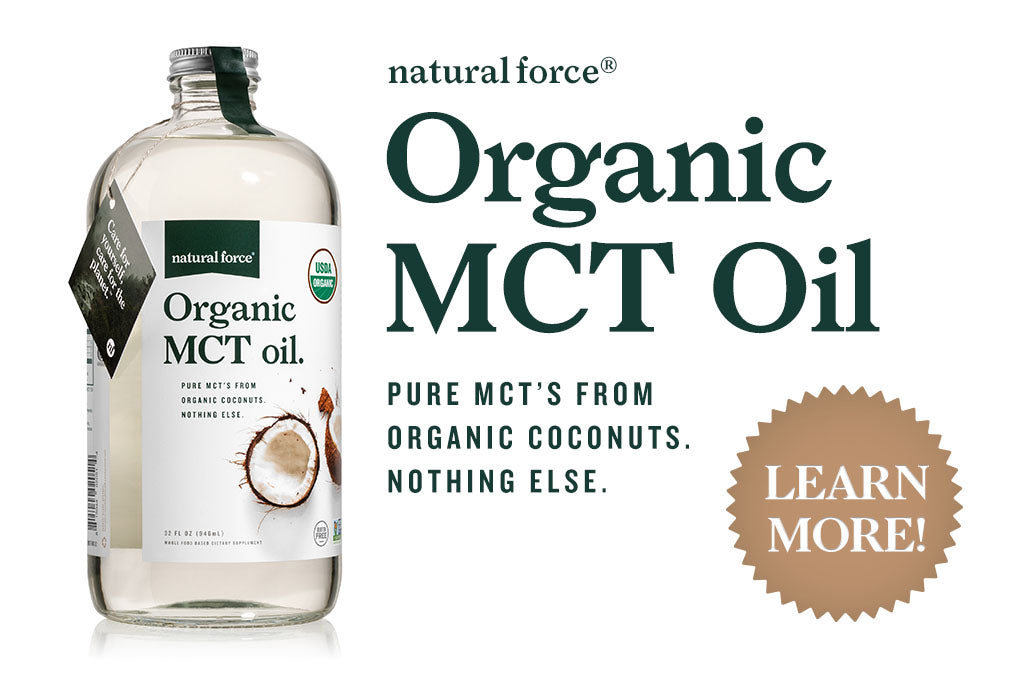What Is MCT Powder? Benefits, Uses & How It Works

MCT powder is a powerful supplement made from medium-chain triglycerides that your body quickly converts into ketones — an efficient fuel source for both the brain and muscles. In this article, we’ll dive into what MCT powder is, the top evidence-based benefits, how it works, and the best ways to use it for energy, cognitive clarity, and fat metabolism.
In this article, you will learn:
- The benefits of MCTs
- What is MCT powder, exactly?
- The problem with MCT powder fillers
- How to choose an MCT powder
- The benefits of MCT powder
- MCT powder vs. MCT oil: which one should you choose?
The Benefits of MCTs
There’s a reason MCT oil is so popular. The benefits of supplementing with MCTs range from better cognitive function to fat loss. MCT oil is tasteless, heat-stable, and easy to digest. It also mixes well in liquids, especially when you use MCT Creamer.
Adding anywhere from a teaspoon to a couple of tablespoons per day can help you to:
- Lose stored body fat or maintain a healthy weight
- Increase your energy
- Boost brain function and banish brain fog
- Improve digestion and nutrient absorption
- Balance specific hormones
This is all great news when it comes to MCT oil, which is what researchers use for nearly all of the published studies on the benefits of MCTs. But what about MCT powder? First, let’s take a look at what MCT powder is and how it’s made.
What is MCT Powder, Exactly?
MCT powder is (quite obviously) a powdered form of MCT oil.
In order to change liquid MCTs into a solid powder form, manufacturers mix the oil with a carrier substance (usually a starch), then spray dry the mixture into a powder form. Picture the oil molecules encapsulated by little starchy shells, then sprayed into a powder.
But it’s the thing that turns MCTs into a convenient powder that can also pose a problem for athletes and health geeks who want to stay away from additives.
Carrier powders used in the spray drying process are sometimes proteins, but most often, they’re low-quality starches that are cheap and easy to work with. The starch to MCT ratio will vary from product to product, but MCT powders will generally contain anywhere from 50-80% MCTs and 20-50% starchy powder. This is not only a problem for people avoiding carbohydrates, which can raise insulin levels and kick you out of ketosis, but it can also be an issue for people with food sensitivities or those who want to stick to a whole foods diet.
Common additives for the spray drying process are:
- Soluble corn fiber and other grain-based fillers
- Acacia fiber (derived from the sap of the acacia tree)
- Maltodextrin (usually made from corn or wheat)
- Soy lecithin (soy-derived)
- Sodium caseinate (dairy-derived)
- Glucose syrup solids (derived from corn, rice, wheat, or potato starch)
- Other additives that aren’t reported on the label
The Problem with MCT Powder Fillers
Fillers don’t have to be bad. Acacia fiber is high in soluble fiber and less likely than other fillers to cause digestive upset.
Corn and grain-based fillers, on the other hand, can cause some side effects and contribute little to nothing in the way of nutrition:
They Mess with Your Blood Sugar
Depending on the type of carrier and the starch-to-fat ratio, MCT powders can raise insulin levels and kick you out of ketosis.
They Affect Your Gut
MCT oil has a reputation for causing loose stools if you take too much at once, but you can easily avoid this by starting with small doses (1 tsp.) and working your way up over time. (We've got a whole article on how much MCT Oil you should take per day)
People report way less gastrointestinal distress with higher doses of MCT powders, but that doesn’t mean powders are totally off the hook when it comes to gut health. Most bulk MCT powders use carriers and other fillers like glucose syrup solids, corn byproducts, and maltodextrin, which are potential gut irritants.
They Contain Food Allergens
Corn-, soy-, wheat-, and dairy-based fillers can be a problem for people with allergies or sensitivities to these ingredients. To add insult to injury, most are made from genetically modified grains. If you suffer from food allergies, sensitivities, or want to maintain a special diet like Paleo or AIP, then stay away from these fillers.
How to Choose an MCT Powder
You can avoid all of these pitfalls by studying the ingredient list and checking the carbohydrate, sugar, and fiber content on the label.
Avoid MCT powders that don’t list their ingredients or contact the company directly to make sure they’re not leaving out any important information. Or to be completely safe, stick with MCT oil until more about the benefits and shortcomings of MCT powders is known.
Check the MCT to other ingredient ratio. Chances are, this won’t be on the packaging. Instead, you’ll have to contact the manufacturer to find out how much MCT oil you’re getting per gram. Obviously, you want the higher MCT to starch ratio. The best we’ve seen is about 80% MCTs to 20% filler.
The quality of MCT oil still matters! Make sure the MCT oil in your powder is extracted from sustainably sourced coconuts.
The Benefits of MCT Powder
Some people consider MCT powder a more versatile option than MCT oil, especially when it comes to adding MCTs to a powdered supplement. For instance, if a manufacturer wants to add some fat-burning MCTs to whey or other protein mix, MCT powder makes a lot more sense than oil. Powder has some other benefits, too:
- Easily add MCTs to powders, other supplements, and baked goods.
- Add a rich texture to smoothies, coffee, and baked goods.
- Since the powder is cut with a starch, it’s less likely you’ll experience digestive distress, which is common with high doses of liquid MCTs.
- Powders are easier to put into single-use packets and are generally easier to travel with.
- There’s talk of being able to consume more MCTs via the powder form without the digestive distress that can occur when you take too much MCT oil. But there’s no published evidence on this, yet.
MCT Powder vs. MCT Oil: Which One Should You Choose?
There are some potential benefits to MCT powder, but there’s no research yet that proves its benefits over regular MCT oil.
At best, it’s a convenient way to add some healthy fats to your diet. At worst, your MCT powder could contain starches and other additives you don’t need. Be sure to check the ingredients list before you make any purchases, and in the meantime, stick to pure, high-quality MCT supplements you can trust.
Want to learn more? Check out our other guides on ketogenic nutrition, brain-boosting supplements, and fat-adapted performance. Also, feel free to subscribe to our newsletter for deeper dives and evidence-based tips.
Frequently Asked Questions (FAQ)
What is MCT powder?
MCT powder is a dried form of medium-chain triglycerides that your body quickly converts into ketones, making it a fast and clean energy source for both the brain and body.
How does MCT powder work?
Your body absorbs MCTs rapidly and converts them into ketones in the liver, providing energy without requiring carbohydrates or long digestion times.
What are the main benefits of MCT powder?
MCT powder may support steady energy, improved mental focus, easier ketosis, and better digestive comfort compared to MCT oil.
Is MCT powder better than MCT oil?
Many people find MCT powder easier to digest and gentler on the stomach, while still offering similar ketone and energy benefits as MCT oil.
How do you use MCT powder?
Add 1 serving to coffee, smoothies, shakes, or recipes for a clean energy boost; start with a low dose and increase gradually if new to MCTs.
Is MCT powder good for keto?
Yes — MCTs are rapidly turned into ketones and are commonly used to support ketosis, workout energy, and mental clarity on low-carb diets.
Can MCT powder help with weight loss?
MCTs may promote satiety, support fat metabolism, and provide clean energy, which can indirectly support weight loss as part of a calorie-controlled diet.
Is MCT powder safe to use daily?
Yes — most people can use MCT powder daily, though new users should start with small servings to avoid digestive discomfort.
(Want to get articles like this by email? Here's the sign-up)

